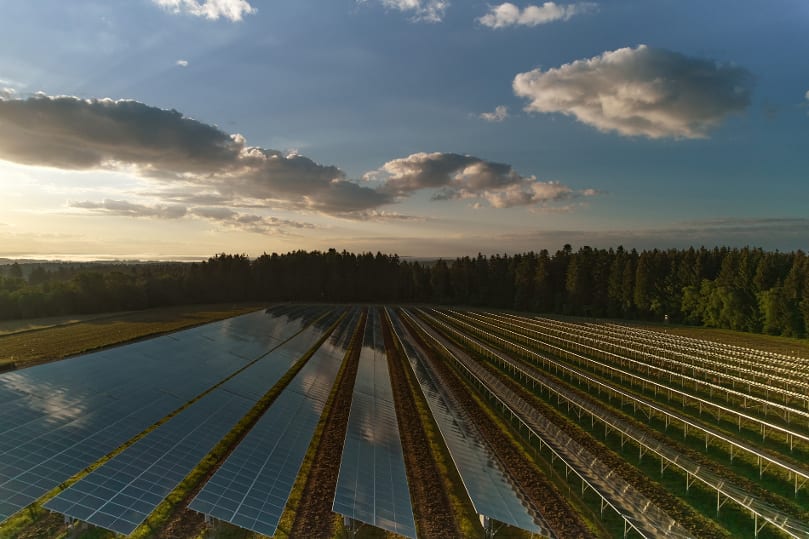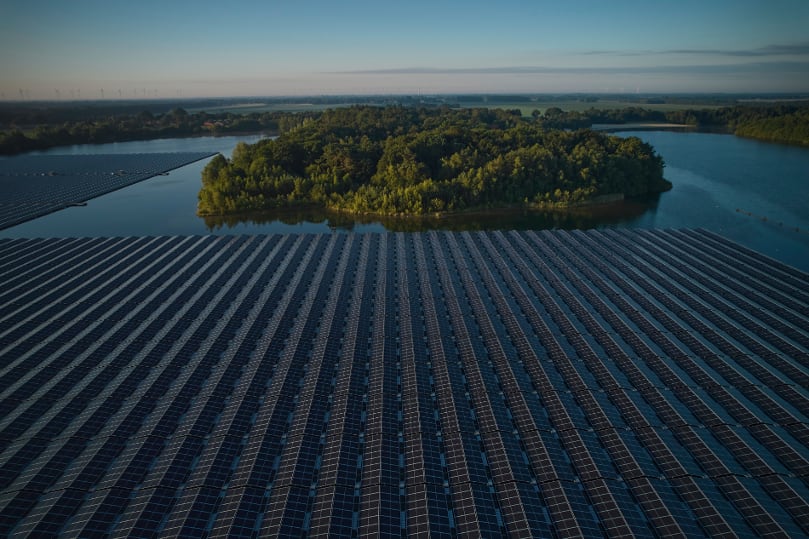People of BayWa
Planning solar projects in an ecologically & economically smart way

Dr. Adam, what exactly do you do at BayWa r.e Solar Projects GmbH?
Dr. Nora Adam: I deal with the ecological aspects of our solar projects. I investigate where economic risks can be avoided or minimized as far as possible on an ecological level - soil, biomass, biodiversity, water, air. We derive standards from these findings, which are incorporated into a manual. BayWa r.e can then refer back to them in other projects so that the wheel does not have to be reinvented next time. At its core, it is always about harmonizing ecological and economic aspects.
How can we imagine your job in practice?
Let's take southern Spain, where we are currently planning a PV system. This is a region that has major problems with soil erosion. When it rains heavily, soil particles come loose in a short space of time, which can cause a site to sink or collapse. How is long-term operation possible on such an area? How can we get the risk of soil erosion under control and thus avert the threat of repair costs later on? That is my job to find out. Project developers, investors and also BayWa r.e as the operator can be sure that the planned plant will run reliably and economically.
How do you determine whether a floor can withstand a PV system?
On the one hand, I do a lot of research, for example in research papers, and on the other hand we carry out our own trials and tests on site. For the project in Spain, I work closely with BayWa Agrar and the former BayWa subsidiary Farm Facts. BayWa Agrar advises me on plant cultivation issues: the aim is to find the most suitable vegetation for soil preparation and later for the park. Among other things, Farm Facts contributes the soil analyses. Based on our findings, we then define the specific measures for soil preparation and planting. The great thing is that the soil can continuously improve over the thirty years that such a plant normally runs. It's great when the experts are in your own company!
The simultaneous improvement of the soil is certainly well received by the population, isn't it?
We even go one step further. If BayWa r.e is already producing green electricity, then it can also improve biodiversity, water and air on its land! Think of the free-floating PV systems, for example. If they are carefully planned and operated, they have the potential to reduce water evaporation and increase biodiversity in the water.
Another important part of my work is agri-PV. Here we develop standards to further improve the dual use of land for agricultural and energy production. To this end, we regularly exchange ideas with our colleagues at BayWa AG and benefit from their expertise, for example in the areas of plant and animal production, irrigation systems and agricultural technology.
How did you come to BayWa r.e?
I was still under contract with the United Nations University in Dresden in 2023. However, I felt more and more the desire for a job where I could combine energy topics and business. The job offer from BayWa r.e Solar Projects suggested the social media platform LinkedIn to me.
What were your first stops in Germany?
I had already spent two years studying in Damascus and came to Germany for the first time at the age of 19 as part of an internship. I worked for three months on an organic farm near Dachau. I was able to lend a hand everywhere and had a family connection. I really enjoyed that.
Nine months later, I returned to Germany on a scholarship and studied forestry in Freiburg until I graduated. I then worked as a PhD student at the Max Planck Institute for Chemical Ecology in Jena, where I completed my doctorate. This was followed by various professional positions in Jena, Leipzig, Dresden and Freiburg.
A research assignment from the Max Planck Institute also took me to a field research station in Utah in the USA. That's just the way it is in research. Research assignments are usually limited in time, so you soon have to look for new employment opportunities.
What field of research were you involved in?
My main topic was biological diversity. It ensures that plants are more robust against predators or weather influences. Take a tomato field, for example. If every tomato bush is only focused on growth, it will find it difficult to withstand external influences.
However, if there are also tomato plants in the tomato field that carry more substances for defense, this makes the entire tomato field more diverse and therefore more resilient. My research was about finding the optimum mix of properties. The object of research in Utah, for example, was a native tobacco plant in the USA, which incidentally is not suitable for consumption.
You last worked at the United Nations in Dresden. Did you also do research there?
Yes, but the task was much broader. For the first time, I had the opportunity to put my knowledge into practice. The United Nations University in Dresden is supporting the lignite phase-out in Lusatia, among other things.
I represented the responsible environmental institute to the outside world and managed the cooperation between stakeholders and decision-makers from industry, politics and business. I was also responsible for various environmental projects and the partnership strategy, as well as supervising employees, consultants and students. It was at that time that I first came into professional contact with the topic of renewable energies.
What do you expect after this eventful life as a researcher?
After many positions in research, I appreciate the continuity at BayWa r.e! But it certainly won't be boring. The renewable energies sector is far too innovative and dynamic for that.

